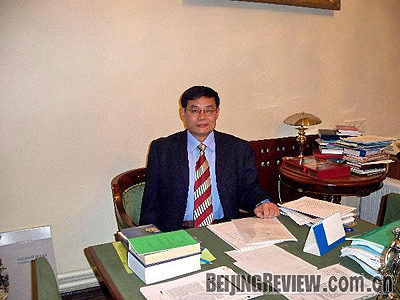|

Legislative work has been high on the work agenda of the National People's Congress (NPC), China's top legislature, and its standing committee since the First Plenary Session of the 10th NPC in March 2003. The 2003 Plenary Session of the NPC outlined the legislative work of the five-year tenure of the 10th NPC, which was to establish a socialist legal system with Chinese characteristics. It also emphasized that the key to legislative work over five years would be continually improving the quality of legislation. The blueprint drafted by the NPC Standing Committee listed 76 laws to be made, of which 59 would enter the deliberation stage and another 17 would be drafted based on thorough deliberation.
Through the hard efforts of the last five years, the 10th NPC and its standing committee have fulfilled the 2003 legislation blueprint through conducting the fourth amendment to the Constitution in 2004 and formulating and revising a total of 69 laws (see table on Laws Adopted and Revised of the Last Five Years). These projects have improved the construction of China's legal system in quantity and quality. So far, China has all the fundamental and major laws, consisting of seven areas of law, including the Constitution and related laws, civil and business law, administrative law, economic law, social law, criminal law and procedure law. The three layers of the legal framework are laws, administrative regulations and regional statutes, which have applied the rule of law to all aspects of political, economic, cultural and social life in China.
Law for the people
Over recent years, the legislative work of the 10th NPC and its standing committee has exhibited the following characteristics:
First, the legislative work has stuck to fully implementing the Scientific Outlook on Development and building a socialist harmonious society. Addressing a grand rally to mark the 50th anniversary of the founding of the NPC, Chinese President Hu Jintao said the law should reflect the balanced development of urban and rural areas, balanced development of different regions, balanced economic growth and social development, balanced harmonious development between human beings and nature and balanced domestic development and opening up. Other guidelines for legislative work, such as people-oriented legislation, social harmony, people's livelihood and rights were emphasized.
Second, in terms of content, legislative work has highlighted the synchronized progress in economic law, social law, civil and business and criminal law. This has been totally different from the long-time practice of centering on enacting economic laws, thus promoting the perfection of the legal system. The legislative work of the last five years has focused on social law. For example, the Employment Promotion Law, Labor Contract Law and Law on Mediation and Arbitration of Labor Disputes have been promulgated in the last five years. Before the 10th NPC, social law accounted for only 2 percent-6 percent of the total number of laws while economic law accounted for 40 percent-60 percent. The proportion of social laws has been climbing steadily over the last five years, to nearly 20 percent of national laws. In some regions, social law now accounts for 30 percent-40 percent of regional statutes, which reflects the requirements of a people-oriented and harmonious society.
Third, public participation in the legislative process has been institutionalized and standardized. For example, to collect public opinion on law drafts, the Legislative Affairs Commission of the NPC Standing Committee has held hearings on Individual Income Tax Law and solicited opinions from experts and people of all walks of life on the Labor Contract Law, the Real Right Law and the Employment Promotion Law. The publicized draft of the Labor Contract Law received over 190,000 suggestions from the public, of which 65 percent came from the individual workers. Some of these suggestions came from the standing committees of people's congresses of many provinces, autonomous regions and municipalities, departments of the Central Government, large enterprises, institutions of higher learning and non-governmental organizations.

In the deliberation of the Real Right Law, after the full text of the draft
|
